To maintain the health of your brain, muscle, bone, nerves, skin, blood circulation, immune system, and every other cell in your body, you need to consume an adequate amount of macronutrients and micronutrients.
Macronutrients, primarily proteins, fats, and carbohydrates, are needed in large amounts, and you can learn more about them in this article. Keto micronutrients, on the other hand, are required in much smaller quantities (which is why we call them “micronutrients”), but failing to get even a tiny dose of these nutrients will vastly increase your risk of developing a health condition.
Micronutrients can be broken down into two main categories: vitamins and minerals. Throughout this article, we will learn more about each of these micronutrient groups, the purpose of each micronutrient in these groups, and how to ensure that you are eating enough of each one.
The Main Purposes of Vitamins and Minerals
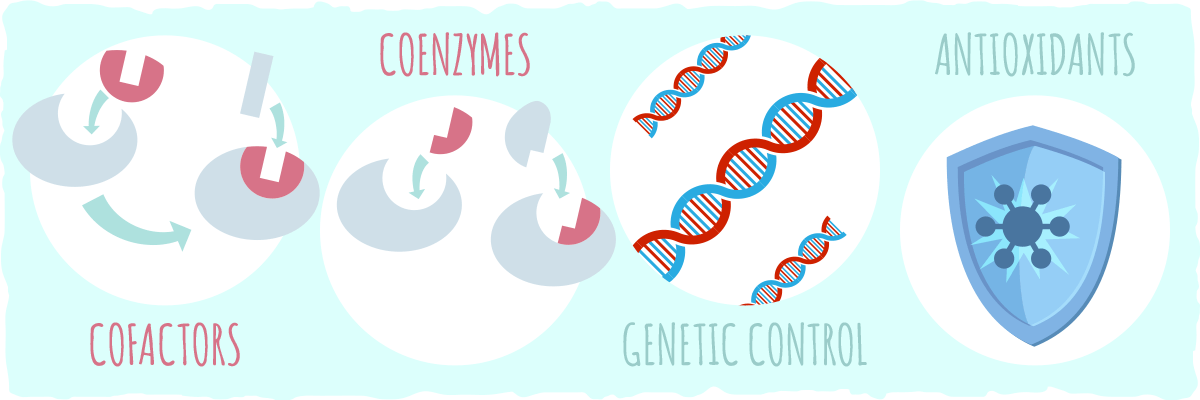
All vitamins and minerals play vital roles throughout the body. Although each vitamin and mineral has specific purposes (which we will learn about later in this article), almost all of their effects can be placed into one or more of these four general categories:
- They are cofactors in metabolism. Cofactors are substances whose presence is essential for the activity of an enzyme. Trace minerals, for example, are frequently involved in regulating enzyme activity or are an integral part of enzyme groups. One of the most common cofactors in the body is zinc, which modulates over 300 enzymes necessary for fertility, protein production, cell growth, and immune system function.
- They serve as coenzymes in metabolism. Many vitamins are required to play an active part in complex biochemical reactions. For example, many b-vitamins, like riboflavin and niacin, are necessary for the electron transport chain to function efficiently and folate is essential for methyl group transfer. These reactions help us use the food we eat in a way that provides us with energy, proteins, and nucleic acids.
- They help with genetic control. Many micronutrients can have a direct impact on our genes. For example, zinc can bind to DNA and help regulate the production of receptors for steroid hormones and other crucial factors.
- They are antioxidants. Much of the popular interest in micronutrients stems from the recognition that many of them have antioxidant properties. Simply by using what we eat as fuel, we inevitably produce reactive oxygen species or “free radicals,” which have the potential to cause damage within the cell and throughout the body that leads to disease. This damage can be limited or prevented by antioxidant vitamins like vitamin E and vitamin A or by mineral dependent enzyme systems that help us dispose of the toxic compounds that accumulate in the body.
As you can see, these nutrients are critical for many aspects of our health. Without them, we wouldn’t be able to do things like produce energy, prevent disease, and replicate cells properly.
In other words, without vitamins and minerals, we wouldn’t be able to live.
The best way to meet your needs for these nutrients is with a well-balanced diet. To help you figure out exactly how you can do this, we put together a comprehensive list of vitamins and minerals, what they do for you, and what foods you can eat to help you meet your needs.
Vitamins — A Brief Overview
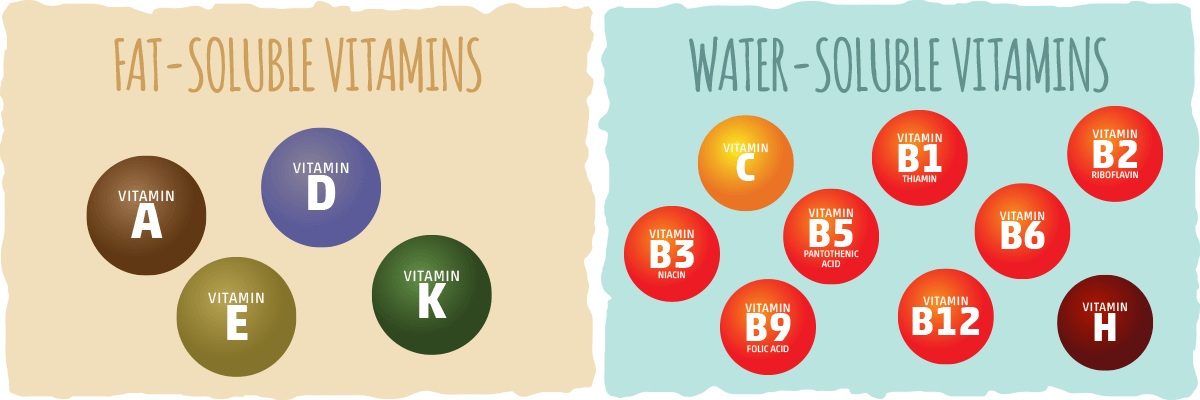
Vitamins are organic compounds that are essential (in very small amounts) for supporting normal physiologic function. We need vitamins in our diets because our bodies can’t synthesize them quickly enough to meet our daily needs.
Vitamins are categorized as being either fat soluble or water soluble depending on whether they dissolve best in either lipids or water. Fat-soluble vitamins are absorbed in the body with the help of fat and can typically be stored in fat globules for long periods of time. Overconsumption of these vitamins can be dangerous.
The fat-soluble vitamins are:
- Vitamin A
- Vitamin D
- Vitamin E
- Vitamin K
Water-soluble vitamins can typically be over consumed without a problem because these vitamins and their metabolites can easily be excreted in the urine.
The water-soluble vitamins are:
- Vitamin C
- The B Vitamins
- Thiamin (Vitamin B1)
- Riboflavin (Vitamin B2)
- Niacin (Vitamin B3)
- Pantothenic Acid
- Vitamin B6
- Folic Acid
- Vitamin B12
- Vitamin H
Fat Soluble Vitamins — A Closer Look at Each One
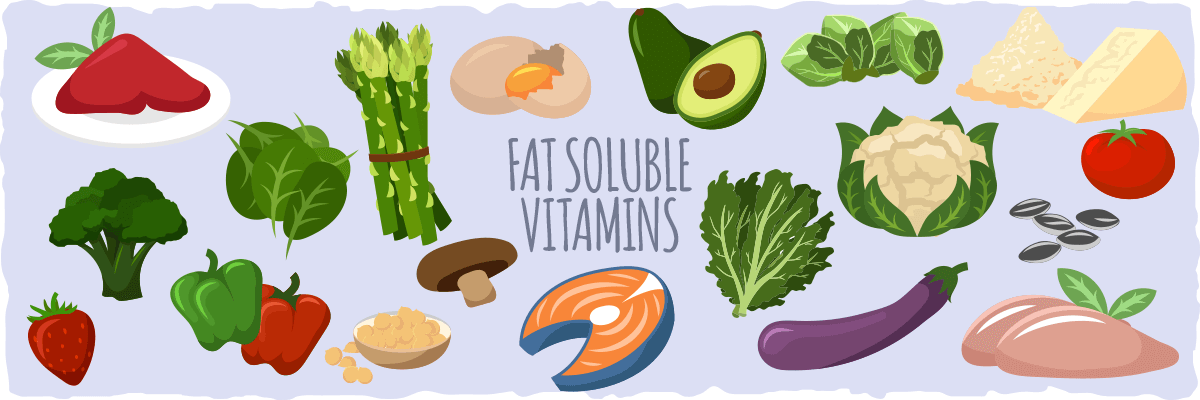
Below, you can find a list of fat-soluble vitamins along with different foods to eat to reach your micronutrient goals.
Vitamin A – Retinol, Retinal and Retinoic Acid
Vitamin A is responsible for many functions in the body. It is essential for cell reproduction and has a significant impact on our vision.
During pregnancy, vitamin A stimulates fetal growth and development by influencing organ growth. It is also an influencer in the development of sperm, the ovaries, and placenta – vital components of the reproductive process.
The most bioavailable form of vitamin A is retinol, which is found in animal foods. Carotenoids, the plant compounds that can be converted into vitamin A, are less bioavailable, and the majority of people struggle to convert carotenoid to the active form of vitamin A.
With that being said, carotenoids will still have health-promoting effects on the body when not consumed in high doses in supplemental form. (You should avoid all supplements that contain high doses of plant-based vitamin A.)
The best sources of retinol (the active form of vitamin A) for keto dieters are:
- Eggs
- Dairy Products
- Fatty Fish
- Beef Liver
The best sources of beta-carotene (the carotenoid that is most efficiently converted to retinol) for keto dieters are:
- Kale
- Spinach
- Mustard Greens
- Collard Greens
- Pumpkin
Vitamin D – Cholecalciferol
Vitamin D is most known for maintaining levels of calcium in the bloodstream. It helps increase the absorption of calcium from food and reduces the amount of calcium excreted.
Vitamin D has other roles in the body, including modulation of cell growth, regulation of neuromuscular and immune function, and reduction of inflammation.
When you are supplementing with vitamin D, make sure you are taking Vitamin D3 (cholecalciferol). Just don’t take too much as excessive supplementation will elevate blood calcium levels and can cause loss of appetite, nausea, vomiting, excessive thirst, excessive urination, itching, muscle weakness, joint pain, and disorientation.
The best sources of vitamin D for keto dieters are:
- Sunlight*
- Fatty Fish
- Eggs
- Organ Meats
- Cod Liver Oil
- Mushrooms
*Even if you are consuming plenty of vitamin D, make sure you are getting at least 12-15 minutes of midday sun (with 40% or more of your skin exposed) per day. Sunlight provides us with many health benefits that extend far beyond what dietary vitamin D3 can do.
Vitamin E – Alpha-Tocopherol
Vitamin E is a potent antioxidant that helps protect LDL cholesterol and cell membranes from damage.
It has been linked with controlling inflammation, regulating blood cells, slowing the aging process, growing connective tissue and aiding in the process of cell division.
The best sources of vitamin E for keto dieters are:
- Nuts
- Avocado
- Green Leafy Vegetables
- Organ Meats
- Eggs
- Olives
- Sunflower Seeds
Vitamin K – Phylloquinone and Menaquinone
Vitamin K is helpful in transporting calcium and works best when the body also has enough vitamin D. It is an essential part of proper bone development, blood clotting, and prevention of osteoporosis. It is often prescribed to people that have problems with excessive bleeding.
Menaquinone or vitamin K2 seems to stay in the blood much longer than phylloquinone (vitamin K1), so many researchers believe that vitamin K2 is superior. If you’d like to get more vitamin K2 in your diet, simply eat more of the animal products that are listed as the best sources of vitamin K.
The best sources of vitamin K for keto dieters are:
- Kale
- Spinach
- Broccoli
- Eggs
- Liver
- Cheese
- Pork
- Chicken Thighs
- Brussels sprouts
- Seaweed
Water Soluble Vitamins — A Closer Look at Each One
Below, you can find a list of water-soluble vitamins along with different foods to eat to reach your micronutrient goals.
Vitamin C – Ascorbic Acid
Vitamin C is a versatile and very important water-soluble vitamin. It acts as an antioxidant, which protects LDL cholesterol (bad cholesterol) from oxidizing and causing plaque build up in our arteries. Plus, it can improve cardiovascular health even further by reducing the stiffness of our blood vessels.
Vitamin C is also needed to make collagen, which strengthens bone, tendons, muscle, and blood vessels, and it aids in the formation of liver bile, which helps detoxify the body.
The best sources of vitamin C for keto dieters are:
- Red Peppers
- Tomatoes
- Broccoli
- Spinach
- Brussels sprouts
- Strawberries
- Kale
- Cauliflower
- Lemon juice
- Parsley
Vitamin B1 – Thiamin
Vitamin B1 is required in the breakdowns of fats, proteins, and carbohydrates. It plays a critical role in the creation of ATP, an energy molecule that is necessary to fuel our cells.
Studies have also uncovered that vitamin B1 is essential for proper heart, muscle cell, nerve cell, and brain functioning.
The best sources of vitamin B1 for keto dieters are:
- Meat
- Bacon
- Organ Meats
- Nuts
- Sunflower Seeds
- Mushrooms
- Spinach
- Eggplant
- Brussels Sprouts
Vitamin B2 – Riboflavin
Vitamin B2 helps the body process fats and amino acids, supports the conversion of macronutrients into ATP, and activates vitamin B6 and folic acid. It can also act as an anti-oxidant in some cases.
The best sources of vitamin B2 for keto dieters are:
- Leafy Green Vegetables
- Mackerel
- Eggs
- Dairy Products
- Meat
- Liver
- Spinach
- Mushrooms
- Almonds
Vitamin B3 – Niacin
Vitamin B3 is a vital component in energy metabolism, helping release the energy from all of our macronutrients. It supports proper circulation, central nervous system functioning, stomach fluid and bile secretion, and healthy skin.
Niacin is also used in the creation of sex hormones, treating some mental illnesses, and as a memory enhancer.
The best sources of niacin for keto dieters are:
- Poultry
- Peanuts
- Meat
- Nuts
- Fish
- Dairy Products
- Green Leafy Vegetables
- Sunflower Seeds
- Mushrooms
Vitamin B5 – Pantothenic Acid
Vitamin B5 plays a major role in extracting energy from fats and protein. It also helps modify certain proteins and produce cholesterol, sex and stress hormones, and red blood cells.
The word “pantothenic” comes from the Greek “pantou,” meaning everywhere. Nearly all foods contain small quantities of pantothenic acid, so deficiencies in this vitamin are very rare.
The best sources of vitamin B5 for keto dieters are:
- Meats
- Poultry
- Liver
- Eggs
- Green Leafy Vegetables
- Broccoli
- Cauliflower
- Sunflower Seeds
- Strawberries
Vitamin B6 – Pyridoxal, Pyridoxamine, and Pyridoxine
Vitamin B6 performs a wide variety of functions in the body and is extremely versatile, with involvement in more than 100 enzyme reactions, mostly concerned with protein metabolism.
This vitamin also plays a role in cognitive development through the biosynthesis of neurotransmitters and in maintaining normal levels of homocysteine, a potentially dangerous amino acid that is found in the blood.
The best sources of vitamin B6 for keto dieters are:
- Meat
- Organ Meats
- Poultry
- Fish
- Leafy Green Vegetables
- Avocado
- Spinach
- Tomato
- Bell peppers
- Sunflower Seeds
Vitamin B9 – Folate and Folic Acid
Vitamin B9 is a key component in cell replication and growth. It is most important for rapidly growing cells, such as those in the fetus, red blood cells, and cells in our immune system.
Folate is the naturally occurring form of vitamin B9 that is found in foods. Folic acid is the synthetic form used in commercially available supplements and fortified foods, and some people cannot metabolize this version of the vitamin efficiently.
It is best to have natural sources of vitamin B9 to prevent deficiency and decrease the risk of neural tube defects and some cancers.
The best sources of natural folate for keto dieters are:
- Organ Meats
- Leafy Green Vegetables
- Asparagus
- Broccoli
- Brussels Sprouts
- Citrus Fruits
- Spinach
- Avocado
- Peanuts
- Tomato
Vitamin B12 – Cyanocobalamin
Vitamin B12 is needed for numerous processes in the body, including DNA replication, nerve cell activity, homocysteine level reduction, and the production of various hormones.
We can store a year’s worth of this vitamin – but it should still be consumed regularly. B12 is a product of bacterial fermentation, which is why it’s not present in plant foods and typically deficient in the vegan diet.
The best sources of vitamin B12 for keto dieters are:
- Eggs
- Fish
- Meats
- Liver
- Dairy Products
- Fermented foods
Vitamin H – Biotin
Vitamin H is a part of the vitamin B-complex, and is also known as vitamin B7.
It is involved in the process of energy production, the synthesis of fatty acids, and nervous system proliferation. Biotin also plays key roles in histone modifications, gene regulation (by modifying the activity of transcription factors), and cell signaling.
The best sources of biotin for keto dieters are:
- Dairy Products
- Meat
- Poultry
- Nuts
- Green leafy vegetables
- Avocado
- Raspberries
- Cauliflower
- Salmon
Minerals
Minerals comprise the other side of the micronutrient coin, and most of them are considered to be essential. There are two primary groups of minerals — macrominerals and microminerals.
Macrominerals are required in amounts of 100 mg or more per day. The minerals in this category are calcium, chlorine, magnesium, phosphorus, potassium, sodium, and sulfur.
Microminerals, on the other hand, are required in much smaller amounts (typically less than 15 mg per day). The minerals that we will discuss in this category are chromium, copper, iodine, iron, fluoride, manganese, molybdenum, selenium, and zinc.
In general, the minerals mentioned above play a crucial role in bone integrity, energy production, nerve and muscle function, and immune health.
Macrominerals — A Closer Look at Each One
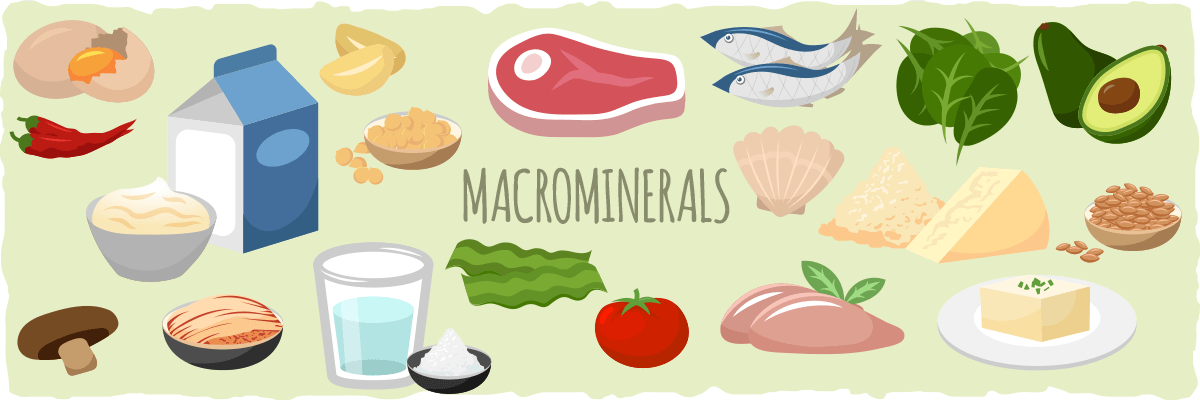
Below, you can find a list of macrominerals along with different foods to eat to reach your micronutrient goals.
Calcium
Calcium is the most abundant micronutrient in our body. It helps form our bones and teeth, which hold about 99% of all calcium in our bodies.
This macromineral also helps with blood clotting, muscle contractions, regulating blood pressure, and transmitting signals between nerve cells.
The best sources of calcium for keto dieters are:
- Dairy Products
- Fish With Bones
- Nuts
- Leafy Green Vegetables
- Tofu
Chlorine
Chlorine plays an essential role in maintaining life. It is responsible for the maintenance of nerve membranes, nutrient absorption, the transportation nutrients between cells, the regulation of acid-base balance throughout our bodies, and the maintenance of blood pressure, among other things.
The best sources of chlorine for keto dieters are:
- Table Salt
- Tap and Bottled Water
- Seafood
- Seaweed
- Pickled foods
- Salted foods
- Celery
- Lettuce
- Tomatoes
Magnesium
Magnesium plays many roles in our bodies. For example, it is needed for protein synthesis, fatty acid formation, cell reproduction, muscle contractions, blood clotting, and is used in the production of ATP.
Studies have also found magnesium to be helpful for maintaining healthy blood sugar levels, reducing asthma symptoms, and improving sleep quality.
The best sources of magnesium for keto dieters are:
- Leafy Green Vegetables
- Nuts
- Avocado
- Meat
- Dairy Products
- Fish
Phosphorous
Phosphorous is normally found as a combination of oxygen and phosphate called phosphate.
Most of the phosphate in our bodies is in bone, but phosphate can also be found in our cell membranes and lipoproteins (HDL and LDL cholesterol). Phosphate also plays a crucial role in the biochemical reactions within cells.
The best sources of phosphorous for keto dieters are:
- Meats
- Poultry
- Seafood
- Eggs
- Nuts
- Seeds
- Dairy Products
- Mushrooms
- Vegetables
Potassium
Potassium is needed to regulate water balance, blood pressure, and the acid-base balance of our blood.
Potassium also works together with other minerals like sodium to ensure proper nervous system function and regulate the transmission of signals between our nerves.
The best sources of potassium for keto dieters are:
- Green Leafy Vegetables
- Tomato
- Avocado
- Nuts
- Dairy Products
- Meats
- Poultry
- Fish
- Mushrooms
Sodium
Sodium is most commonly consumed in the form of table salt. It works together with other minerals to maintain the positive and negative ions throughout our bodies in a way that allows cells (especially our nerve cells) to function properly.
Sodium also helps increase the solubility of other minerals, allowing us to assimilate them more efficiently.
The best sources of sodium for keto dieters are:
- Table Salt
- Fermented Foods
- Fish
- Shellfish
- Seaweed
- Peppers
- Pickles
Sulfur
Sulfur is used in the creation of hormones, protein, and amino acids. These molecules will then help improve energy levels, neutralize toxins, improve immune function, and maintain the health of our hair, skin, and muscles.
The best sources of sulfur for keto dieters are:
- Vegetables
- Meats
- Eggs
- Garlic
- Fish
- Dairy Products
Microminerals — A Closer Look at Each One
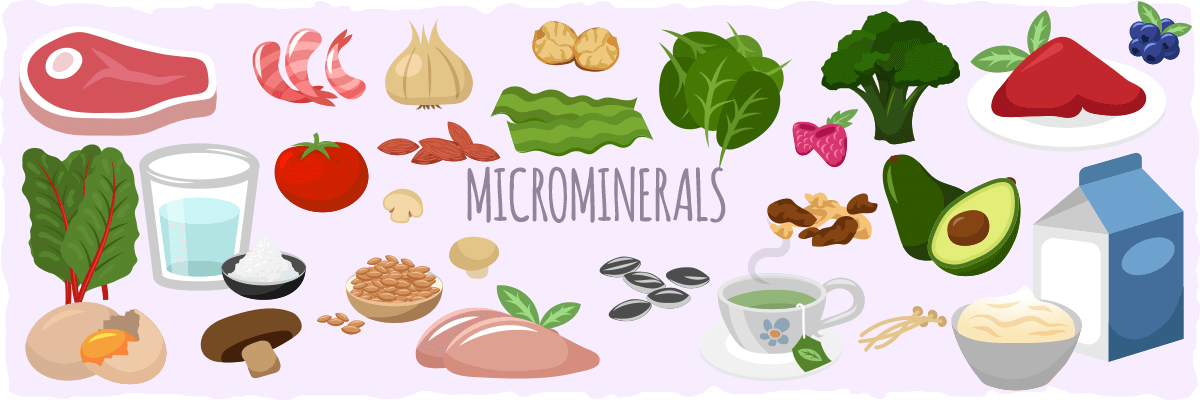
Below, you can find a list of microminerals along with different foods to eat to reach your micronutrient goals.
Chromium
Chromium is a mineral that the body uses in small amounts for normal body functions, such as digesting food and controlling blood sugar levels. It may be useful for helping improve insulin function in people who have type 2 diabetes as well.
The best sources of chromium for keto dieters are:
- Lettuce
- Onions
- Tomatoes
- Nuts
- Mushrooms
Copper
Copper is an essential trace mineral that is used in a variety of processes throughout the body. The major function for copper is in catalyzing oxidation-reduction (REDOX) reactions important for the activity of a number of enzymes. It is also needed to absorb, store, metabolize, and utilize iron.
The best sources of copper for keto dieters are:
- Leafy Green Vegetables
- Mushrooms
- Liver
- Sunflower Seeds
- Seafood
- Nuts
Flouride
About 95% of the total body fluoride is found in bones and teeth. Although its role in the prevention of dental caries (cavities) is well established, fluoride is not generally considered an essential mineral because humans do not require it for growth or to sustain life.
The best sources of fluoride for keto dieters who want to prevent cavities are:
- Tap Water
- Bottled Water
- Flouridated Toothpaste
- Caffeinated Tea
- Kombucha
Iodine
Iodine is responsible for some of the developmental aspects and functional aspects of the thyroid. Your thyroid gland uses it to make thyroid hormones that help control growth, repair damaged cells, and support a healthy metabolism.
The best sources of iodine for keto dieters are:
- Seaweed
- Shellfish
- Fish
- Eggs
- Iodized Table salt
Iron
Iron is one of our most vital minerals. It is part of hemoglobin and myoglobin, which carry oxygen through our bloodstream to our organs and muscles. Iron also aids in the process of ATP creation, our most prevalent energy molecule.
The best sources of iron for keto dieters are:
- Meat
- Organ Meats
- Poultry
- Fish
- Almonds*
- Green Leafy Vegetables*
- Broccoli*
- Pumpkin Seeds*
*Make sure you consume foods that are high in vitamin C when you are trying to meet your iron needs with plant-based foods. This will help increase iron absorption from the foods that have the least bioavailable source of iron (non-heme iron).
Manganese
Manganese is a trace mineral that is mainly used to manufacture enzymes that are responsible for the metabolism of fats and proteins. It also supports the immune system, balances our blood sugars, aids in the production of ATP, and facilitates healthy bone growth.
The best sources of manganese for keto dieters are:
- Nuts
- Leafy Green Vegetables
- Berries
- Eggs
- Avocados
- Tea
- Seaweed
Molybdenum
This essential mineral plays many roles throughout the body. For example, molybdenum serves as a catalyst for enzymes that detoxify our bodies, protect us from cancer, and decrease inflammation.
The best sources of molybdenum for keto dieters are:
- Nuts
- Diary
- Leafy Green vegetables
- Liver
- Eggs
Selenium
Selenium is an essential trace mineral that is important for many bodily processes, including cognitive function, building a healthy immune system, and maintaining fertility in both men and women.
It also contributes to thyroid hormone metabolism (similar to iodine), aids in DNA synthesis, and serves as an antioxidant that protects us against oxidative damage and infection.
The best sources of selenium for keto dieters are:
- Brazil Nuts
- Mushrooms
- Eggs
- Walnuts
- Seafood
- Meat
Zinc
Zinc has so many benefits throughout the body that it is impossible to cover them all in a couple of paragraphs.
To sum it up succinctly, zinc is a component of over 300 enzymes needed to heal wounds, maintain fertility, synthesize proteins, aid cellular reproduction, protect against free radicals, and boost immune system function.
The best sources of zinc for keto dieters are:
- Spinach
- Pumpkin Seeds
- Meat
- Poultry
- Eggs
- Fish
- Shellfish
- Dairy
- Mushrooms
What About Nutrient Deficiencies?
Nutrient deficiencies are only common when we consume a highly processed diet with minimal food variety or when we reduce our calorie intake significantly. To prevent or reduce the severity of certain health issues, it is best to make sure you are consuming an adequate amount of vitamins and minerals.
Throughout the past decade, the most common nutrient deficiencies in North America have been:
- Calcium
- Chromium
- Magnesium
- Vitamin B6
Specific diets can set you up for particular nutrient deficiencies as well.
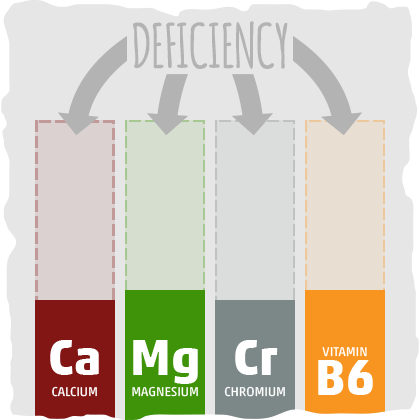
The vegan diet, for example, tends to be very low in B12, which causes most vegans to become deficient in this vitamin to the point where the may experience fatigue, anemia, memory loss, or shortness of breath. Any diet that reduces your calorie intake can also lead to micronutrient deficiencies because you are eating less food and thus getting fewer nutrients.
The good news is that if you are following a diet that has a wide variety of whole foods (e.g., low carb vegetables, meat, dairy, seafood, nuts, and seeds), then you will probably be getting an adequate amount of each vitamin and mineral.
To make sure you are meeting you micronutrient needs, it is best to track your dietary intake of vitamins and minerals every so often instead of just assuming that you are meeting your needs. You don’t have to hit your micronutrient needs every day, but for optimal health, it is best to make sure you aren’t chronically deficient in any particular vitamin or mineral.
How to Know If You Are Meeting Your Micronutrient Needs
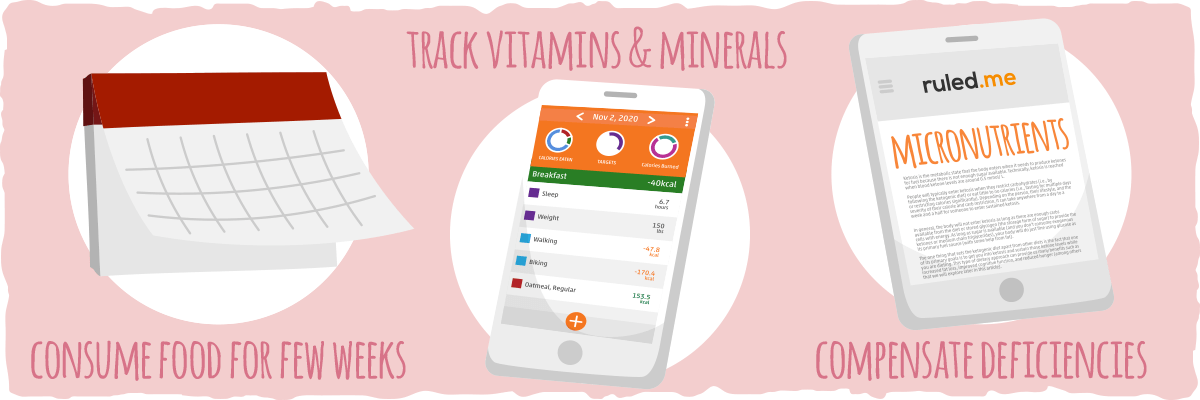
The simplest method that you can use to track your vitamin and mineral intake is utilizing an app that accurately tracks micronutrients. My favorite app for this purpose is Cronometer.
With Crononmeter, you can track your fats, protein, carbs, and net carbs, as well as your vitamin and mineral intake. If you’d like to learn how to use Cronometer for your micronutrient and macronutrient tracking needs, check out this free guide.
After you have Cronometer set up, I recommend tracking your food intake for a couple of weeks. This will hold you accountable to your keto diet while showing you what micronutrients you are struggling to eat enough of.
Once you have tracked your intake for a couple of weeks, dietary patterns will start to emerge. You will be able to see what vitamins and minerals you are getting enough of and the ones that you are deficient in. Check back to this article and look at the keto-friendly foods that will provide you with the vitamins and minerals you need to clear up your micronutrient deficiencies.
For example, if you find out that you aren’t eating enough potassium (which was exactly what happened to me at first), then go to the potassium section of this article and take note of what foods will provide you with a good source of potassium. According to our guide, your hypothetical self should eat some more green leafy vegetables, tomato, avocado, and/or nuts to meet your potassium needs.
If you are still struggling to meet your micronutrient needs after using this approach, try finding a highly bioavailable supplement of the vitamin or mineral that you need more of. Add that supplement to your daily regimen and see if that helps you meet your needs and improve your health.
Just make sure you stay within the recommended intakes of each micronutrient unless your physician tells you to do otherwise. Consuming vitamins and minerals in high doses is much easier than you may think, and many of them can cause adverse health effects when taken above the recommended intakes.
For those of you who would like to get more specific with your micronutrient needs and/or track them without the app, here are links to the official dietary reference intakes of the United States:
- Dietary Reference Intakes (DRIs): Recommended Dietary Allowances and Adequate Intakes, Vitamins
- Dietary Reference Intakes (DRIs): Recommended Dietary Allowances and Adequate Intakes, Minerals
Before you click these links, it is important to understand a couple of key concepts first. Recommended Dietary Allowances (RDA) are the average daily dietary intake level sufficient to meet the nutrient requirements of nearly all (97–98 percent) healthy individuals in the group on the table.
An Adequate Intake (AI) is reflecting that there isn’t sufficient scientific evidence to establish an average estimated requirement. However, the AI for most life stages and gender groups is believed to cover the needs of all healthy individuals in those groups — we just don’t have enough evidence to provide an accurate percentage estimate of exactly how many people are covered by the AI suggestions.
Putting It All Together — Micronutrients and The Optimal Diet Approach for Meeting Your Needs
Vitamins and minerals are essential for disease prevention and optimal well being. The adequate intake of these micronutrients from food and/or supplements is necessary to prevent deficiency, promote optimal health, improve nutrient partitioning, and promote fat loss and muscle gain.
Vitamins exist as fat soluble or water soluble organic compounds. The fat-soluble vitamins are vitamin A, vitamin D, vitamin E, and vitamin K. The water-soluble vitamins are vitamin C and the 8 B vitamins.
Minerals can be divided into two categories: macrominerals and microminerals. The macrominerals are calcium, chlorine, magnesium, phosphorus, potassium, sodium, and sulfur. The microminerals that we discussed are chromium, copper, iodine, iron, fluoride, manganese, molybdenum, selenium, and zinc.
All of the vitamins and most of the minerals play a variety of crucial roles throughout our bodies that we cannot live without. However, these aren’t the only nutrients that ensure optimal health.
Macronutrients, for example, provide us with the raw materials we need for energy, structure, strength, hormones, neurotransmitters, antioxidants, and enzymes. (If you would like to learn more about macronutrients, check out this article.)
Plant and animal foods also provide us with thousands of compounds that have vitamin-like properties. We may be able to live without these compounds, but they are surely essential for optimizing our health and vitality.
For these reasons, it is best to meet your micronutrient needs with your macros, not with vitamin and mineral supplements. What I mean by this is that you should eat whole foods that are micronutrient dense like eggs, organ meats, meat, poultry, seafood, nuts, seeds, and low carb vegetables. Eating a wide variety of these keto foods will help you meet your micronutrient and macronutrient needs, while you also provide your body with thousands of other health-promoting plant and animal compounds.
To help you keep track of how much you are eating of each macronutrient and micronutrient, I recommend using Cronometer and implementing the suggestions that you find in this article to set it up.
Sources:
- Vitamin and mineral requirements in human nutrition — World Health Organization
- Micronutrient Facts — Center for Disease Control and Prevention
- Micronutrients have major impact on health —Harvard Medical School
- Micronutrients in health and disease — NCBI
- Nutrient Recommendations: Dietary Reference Intakes (DRI) — National Institutes of Health
- Benefits of Sunlight: A Bright Spot for Human Health — NCBI
- All About Vitamins & Minerals — Precision Nutrition